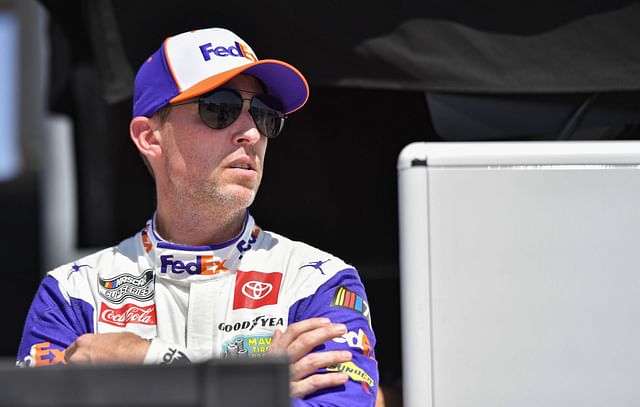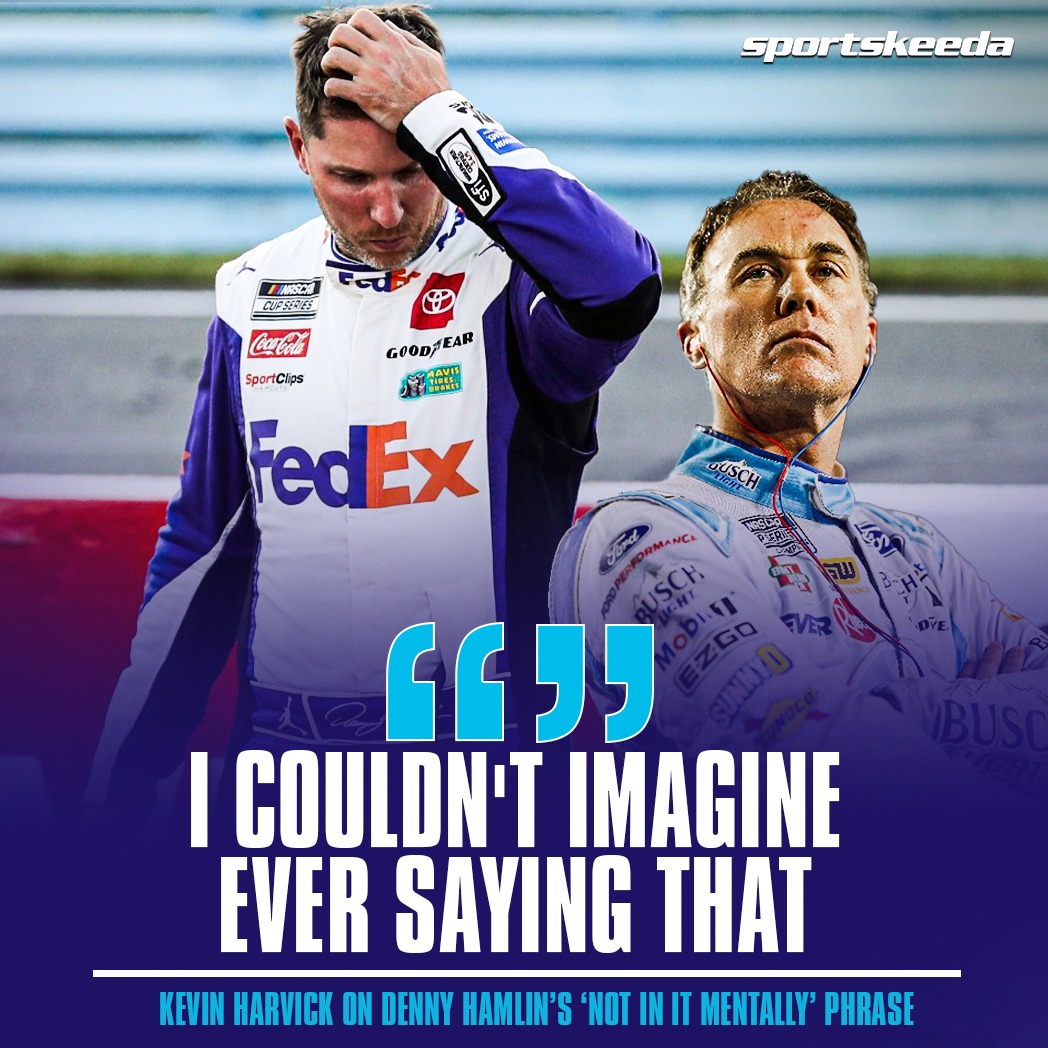In the latest episode of his *”Actions Detrimental”* podcast, NASCAR driver Denny Hamlin voiced his concerns about the ongoing issue of declining respect among drivers in the racing circuit. This is not a new issue for Hamlin, but one he shares with fellow racer Martin Truex Jr., who has expressed similar frustrations for quite some time. Both drivers are worried about the increasingly careless and disrespectful behavior they’ve witnessed during certain high-stakes moments in races, particularly during the final laps.
Hamlin pointed out that Truex has had this complaint for a while, emphasizing that the racing dynamic has changed from what it used to be. According to Hamlin, drivers no longer show the same level of respect to one another, especially during intense situations like green-white-checkered finishes. Hamlin noted that year after year, the level of respect decreases, and reckless driving becomes more prevalent. He described how drivers are willing to force their cars into any available space, regardless of how narrow the gap may be. If there’s “a quarter of a car width” of space, drivers will jam their cars in, risking collisions and spins, without considering the consequences for their fellow competitors.
This aggressive behavior in the final moments of a race, Hamlin said, reflects a broader issue of accountability, or rather, the lack of it. Drivers no longer feel the need to take responsibility for their actions on the track. If they cause another driver to spin out or wreck, they simply move on without acknowledging their role in the incident. Hamlin expressed that this mentality is a significant problem in NASCAR today, and it’s contributing to an environment where recklessness is becoming the norm.
One solution Hamlin proposed is self-policing. He believes that drivers need to hold each other accountable for the chaos on the track. If a driver feels that someone else caused an accident or wreck, they should address it directly. This could involve confronting the other driver or finding a way to make it clear that reckless driving won’t be tolerated. However, Hamlin acknowledged that changing this culture isn’t easy. As long as drivers feel free to behave aggressively without consequence, the problem will persist, particularly during high-pressure moments like green-white-checkered finishes.
Hamlin referenced Martin Truex Jr.’s recent frustrations following a disappointing race at Watkins Glen, where Truex finished in 20th place. The race left Truex feeling exasperated, especially as he felt unfairly targeted during the final stages of the event. Afterward, Truex expressed his frustration with how the race unfolded, particularly during the restarts. He remarked to the media that he finds it difficult to understand how drivers can claim to be the best in the world while driving through each other in restarts at the end of races. For Truex, these chaotic moments undermine the integrity of the competition. He added that he was fed up with the current state of things, concluding his post-race comments with, “I’m out of here,” signaling his readiness to step away from the frustrations of the day.
Hamlin supported Truex’s stance, describing his teammate’s attitude as “quintessential Martin Truex.” Truex is known for being direct and forthright, so his decision to disengage from the chaos comes as no surprise to Hamlin. However, Hamlin also pointed out that the problem Truex highlighted is not just his personal frustration but a reflection of a larger trend in NASCAR—one that shows no signs of improving anytime soon.
Backing up these concerns, Hamlin’s crew chief, Chris Gabehart, shared his own thoughts during an interview with SiriusXM NASCAR Radio. Gabehart offered a critical analysis of the state of NASCAR racing in these late-race situations, likening them to a game of “bumper cars.” He observed that the final laps, especially after a late-race caution, often descend into chaos, with drivers colliding in their scramble for positions. This disorder, Gabehart argued, detracts from the competitive integrity of the race. He mentioned that the same issues are present in other NASCAR series, including the Xfinity Series, where late-stage cautions also result in a chaotic scramble to the finish.
Gabehart acknowledged that part of the problem is the heightened stakes of these races. With so much on the line, drivers are pushing harder than ever, and the pressure to perform is immense. In this sense, the aggressive driving is understandable, as every position counts. However, Gabehart lamented that while this intensity may create great entertainment for the fans, it comes at the cost of the sport’s overall quality. When racing begins to resemble a game of bumper cars, as Gabehart put it, it’s no longer about skill and strategy but rather survival.
While Gabehart doesn’t claim to have a solution to the issue, he is concerned about the optics of these late-race incidents. For both drivers and fans, the chaotic nature of these moments is starting to overshadow the competitive spirit that defines NASCAR. Gabehart is worried that if the trend continues, it could have long-term negative effects on the sport. The pressure and stakes will always be there, but the way drivers handle these high-pressure situations needs to change if the sport is to maintain its integrity.
In conclusion, the concerns raised by Denny Hamlin, Martin Truex Jr., and Chris Gabehart highlight a troubling trend in NASCAR racing. The lack of respect and accountability among drivers, particularly during high-stakes moments like green-white-checkered finishes, is contributing to a more chaotic and less competitive racing environment. Without some form of self-regulation or cultural shift within the sport, NASCAR risks losing some of its competitive edge as aggressive, reckless driving becomes the norm. For drivers like Truex, the frustration is palpable, and unless something changes, more top drivers may begin to share his sentiment.
Denny Hamlin Hits Out at NASCAR Rivals – ‘Lack of Respect’




